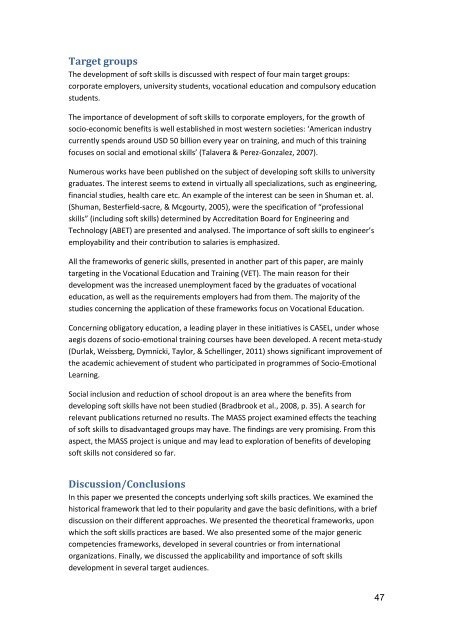Teaching and Assessing Soft Skills - MASS - Measuring and ...
Teaching and Assessing Soft Skills - MASS - Measuring and ...
Teaching and Assessing Soft Skills - MASS - Measuring and ...
You also want an ePaper? Increase the reach of your titles
YUMPU automatically turns print PDFs into web optimized ePapers that Google loves.
Target groups<br />
The development of soft skills is discussed with respect of four main target groups:<br />
corporate employers, university students, vocational education <strong>and</strong> compulsory education<br />
students.<br />
The importance of development of soft skills to corporate employers, for the growth of<br />
socio-economic benefits is well established in most western societies: ‘American industry<br />
currently spends around USD 50 billion every year on training, <strong>and</strong> much of this training<br />
focuses on social <strong>and</strong> emotional skills’ (Talavera & Perez-Gonzalez, 2007).<br />
Numerous works have been published on the subject of developing soft skills to university<br />
graduates. The interest seems to extend in virtually all specializations, such as engineering,<br />
financial studies, health care etc. An example of the interest can be seen in Shuman et. al.<br />
(Shuman, Besterfield-sacre, & Mcgourty, 2005), were the specification of “professional<br />
skills” (including soft skills) determined by Accreditation Board for Engineering <strong>and</strong><br />
Technology (ABET) are presented <strong>and</strong> analysed. The importance of soft skills to engineer’s<br />
employability <strong>and</strong> their contribution to salaries is emphasized.<br />
All the frameworks of generic skills, presented in another part of this paper, are mainly<br />
targeting in the Vocational Education <strong>and</strong> Training (VET). The main reason for their<br />
development was the increased unemployment faced by the graduates of vocational<br />
education, as well as the requirements employers had from them. The majority of the<br />
studies concerning the application of these frameworks focus on Vocational Education.<br />
Concerning obligatory education, a leading player in these initiatives is CASEL, under whose<br />
aegis dozens of socio-emotional training courses have been developed. A recent meta-study<br />
(Durlak, Weissberg, Dymnicki, Taylor, & Schellinger, 2011) shows significant improvement of<br />
the academic achievement of student who participated in programmes of Socio-Emotional<br />
Learning.<br />
Social inclusion <strong>and</strong> reduction of school dropout is an area where the benefits from<br />
developing soft skills have not been studied (Bradbrook et al., 2008, p. 35). A search for<br />
relevant publications returned no results. The <strong>MASS</strong> project examined effects the teaching<br />
of soft skills to disadvantaged groups may have. The findings are very promising. From this<br />
aspect, the <strong>MASS</strong> project is unique <strong>and</strong> may lead to exploration of benefits of developing<br />
soft skills not considered so far.<br />
Discussion/Conclusions<br />
In this paper we presented the concepts underlying soft skills practices. We examined the<br />
historical framework that led to their popularity <strong>and</strong> gave the basic definitions, with a brief<br />
discussion on their different approaches. We presented the theoretical frameworks, upon<br />
which the soft skills practices are based. We also presented some of the major generic<br />
competencies frameworks, developed in several countries or from international<br />
organizations. Finally, we discussed the applicability <strong>and</strong> importance of soft skills<br />
development in several target audiences.<br />
47





